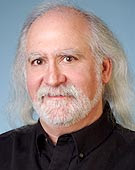El Cluetrain Manifesto es una proclama online desarrollada en el 2001 por Chris Locke, Doc Searls and David Weinberger.
Son 95 thesis IMPERDIBLES. Sobre el nuevo consumidor y el nuevo ambiente de los negocios.
When we created Cluetrain.com in April, 1999, it kicked up some dust. A few thousand people signed their endorsement of the ideas. Lots of email, lots of press coverage. This is the site as it existed then. The conversations continue elsewhere. Please read and enjoy. But don't tap on the glass as it just annoys the animals.
Tambien lanzaron un libro: The Cluetrain Manifesto: The End of Business As Usual. Donde se incorporó a Chris Lock, Doc Searls and David Weinberger, Rick Levin.

Chris Locke: Christopher Locke (clocke@panix.com) is Chairman of The Titanic Deck Chair Rearrangement Corporation (NASDAQ:TDCRC). A noted industry speaker, he is also editor/publisher of the webzine Entropy Gradient Reversals, and president of Entropy Web Consulting in Boulder, Colorado. He launched Internet Business Report for CMP Publications in 1993, was President of MecklerWeb Corporation in 1994, Editor and Publisher of the Net Editors segment on internetMCI in 1995, Program Director for Online Community Development at IBM in 1996, and editor-in-chief of personalization.com in 1999 and 2000. In 2001, he was included in The Financial Times' list of top 50 business thinkers worldwide. He has written extensively for publications such as Forbes, Release 1.0, Information Week, Publish, The Industry Standard, and Harvard Business Review.

Doc Searls (born on July 29, 1947) is a widely-read blogger and a columnist and senior editor for Linux Journal. He is often credited for originating the quote "Markets are conversations", which is also the first thesis in The Cluetrain Manifesto, which he co-wrote in 1999 with David Weinberger, Christopher Locke and Rick Levine. With David Weinberger he also co-wrote "World of Ends: What the Internet Is and How to Stop Mistaking It for Something Else" (See NEA (internet). Both Weinberger and Searls are also fellows with Harvard's Berkman Center, where Searls heads ProjectVRM, a development effort toward Vendor Relationship Management.

David Weinberger (born 1950 in New York) is a technologist, professional speaker,[1] and commentator, probably best known as co-author of the Cluetrain Manifesto (originally a website, and eventually a book, which has been described as "a primer on Internet marketing" [2]). Weinberger's work focuses on how the Internet is changing human relationships, communication, and society.
A philosopher by training, he holds a Ph.D. from the University of Toronto and taught college from 1980-1986. He was a gag writer for the comic strip "Inside Woody Allen" from 1976-1983.[3] He became a marketing consultant and executive at several high-tech companies, and currently serves as a fellow at the Berkman Center for Internet and Society at Harvard Law School. He had the title Senior Internet Advisor to Howard Dean's 2004 presidential campaign.
Si haces click en el titulo de cada entrada accederas al link.

Rick Levine is president of Mancala, Inc., a 'net start-up in Boulder, Colorado, focusing on enabling communication between local merchants and their customers.
Before Mancala, Rick was web architect for Sun Microsystems' Java Software group. He was responsible for the creation of much of the public web interface for java.sun.com, including the Java Developer Connection, a free, registration-based site for Java Developers, currently with more than 1,000,000 registered members.
Rick was with Sun for 13 years. He started his tenure there leading a group that created all the desktop software for Sun's experiments with 386-based workstations, including Sun's first on-line help and easy-to-use system installation and management software. He spearheaded the creation of Sun's first usability testing facilities, and pioneered the integration of human-factors design, usability and visual language disciplines into Sun's engineering universe.
Rick was a member of several teams that worked on reinventing and redesigning Sun's external web presence. He joined the Java Software group in mid-1996, served a stint as webmaster of java.sun.com, and has focused his efforts on driving the creation of web delivery channels that serve both the business needs of the organization and Sun's customers.
Rick has participated in numerous standards activities, including an overly long stint as the lead user interface negotiator for the HP/IBM/Novell/Sun conflagration that created the UNIX Common Desktop Environment. He was Sun's participant in the ICE Authoring Group, creator of the Information and Content Exchange protocol specification for syndication of web content. The ICE protocol was awarded a Seybold Editor's Award in the field of Web publishing
Prior to joining Sun, Rick worked for Control Data's PLATO system group, NCR COMTEN, various smaller companies, and, in ancient prehistory, did a lot of innovative and sometimes just-plain-off-the-wall film, video and videodisk production.

Por favor ingresa tus comentarios.










